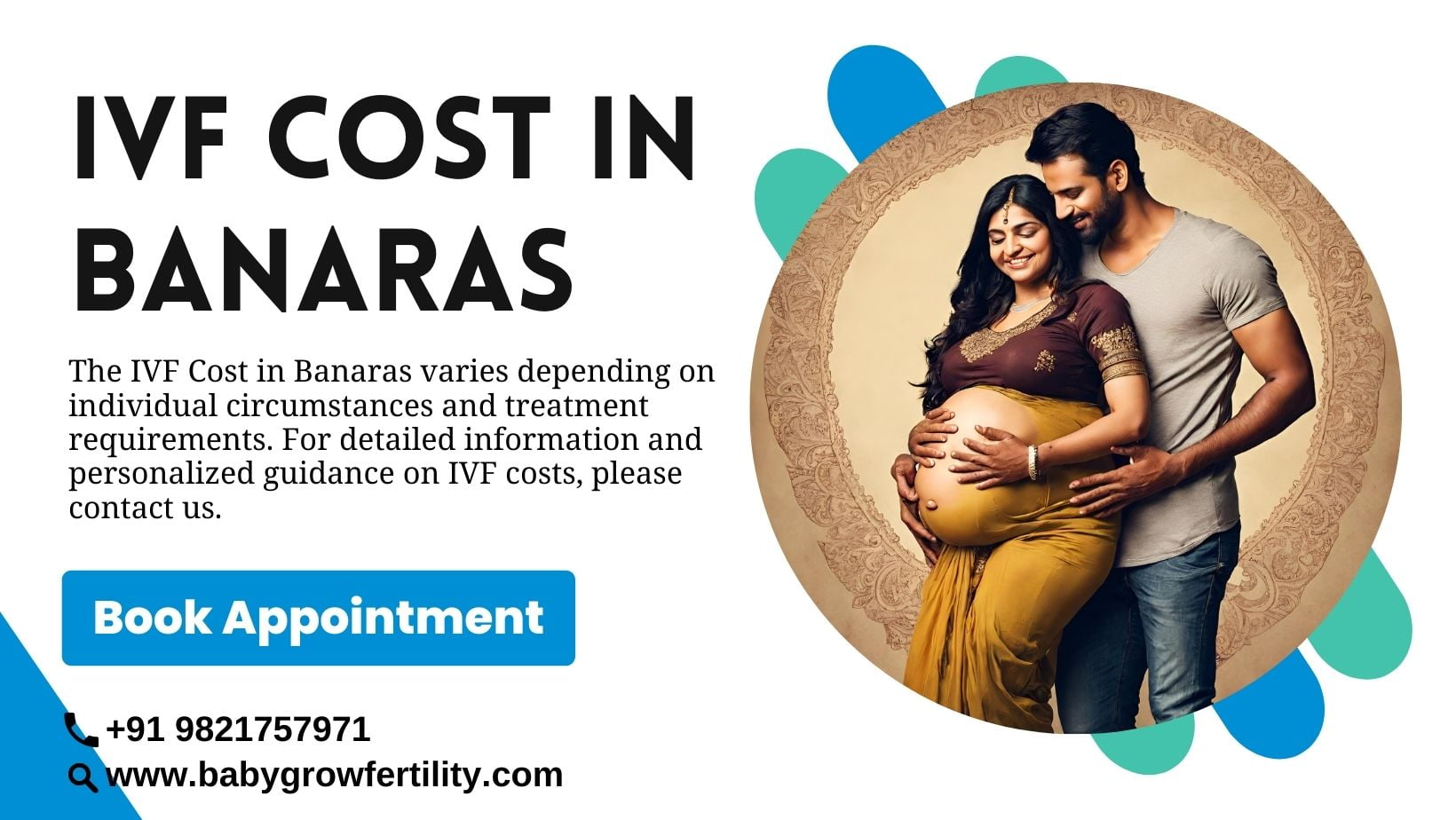Navigating the landscape of IVF treatments can be overwhelming, especially when considering the IVF Cost in Banaras. At our center, we understand the significance of transparency and clarity in such decisions.
Our dedicated team of experts is committed to providing comprehensive information and support to guide you through your fertility journey. From initial consultations to advanced procedures, we offer personalized care tailored to your unique needs. With a focus on excellence and compassion, we strive to make the IVF process as smooth and accessible as possible for every patient.
Whether you’re just beginning to explore your options or ready to take the next step, trust in our expertise and commitment to help you achieve your dream of starting a family. Experience the difference with our compassionate approach to IVF in Banaras.
What is IVF?
In vitro fertilization (IVF) is a complex medical procedure used to help individuals or couples struggling with infertility to conceive a child. During IVF, mature eggs are retrieved from the ovaries of the female partner and fertilized with sperm in a laboratory setting. The fertilized eggs, or embryos, are then transferred to the uterus where they may implant and result in a successful pregnancy. IVF is a widely recognized assisted reproductive technology (ART) and has helped millions of people worldwide to achieve their dream of parenthood.
Why IVF is Used?
IVF is employed when other fertility treatments have failed or are not suitable for the individual or couple. It may be recommended in cases of:
- Blocked or damaged fallopian tubes in the female partner, preventing natural conception.
- Low sperm count or motility in the male partner.
- Unexplained infertility, where the cause of infertility cannot be determined through conventional testing.
- Endometriosis or other conditions affecting fertility.
- Genetic disorders that could be passed on to offspring, where preimplantation genetic testing (PGT) may be utilized.
IVF offers hope to those facing various fertility challenges and provides an alternative path to parenthood for individuals who may not be able to conceive naturally.
Importance of IVF in infertility treatment
IVF plays a crucial role in modern infertility treatment by offering a viable solution to individuals and couples struggling with infertility. It provides an opportunity for those facing complex fertility issues to have biological children of their own. Beyond its biological significance, IVF holds immense emotional and psychological importance for individuals and couples longing to become parents. It offers hope, empowerment, and the chance to fulfill the deeply held desire for a family. Additionally, IVF has contributed to advancing reproductive science and technology, paving the way for continued innovations in fertility treatment. Overall, IVF is not just a medical procedure but a transformative journey towards parenthood for many.
Understanding IVF Procedure
Understanding the IVF procedure involves ovarian stimulation, egg retrieval, fertilization in the lab, embryo transfer, and post-transfer care, offering hope for couples struggling with infertility to achieve pregnancy.
Step-by-step Process of IVF
The step-by-step process of in vitro fertilization (IVF) involves several stages, each carefully orchestrated to maximize the chances of successful conception for individuals or couples facing infertility challenges.
- Ovarian Stimulation: The process typically begins with ovarian stimulation, where fertility medications are administered to stimulate the ovaries to produce multiple eggs. These medications may include injectable hormones such as follicle-stimulating hormone (FSH) and luteinizing hormone (LH). Monitoring of the ovarian response is done through ultrasound scans and blood tests to track follicle development and hormone levels.
- Egg Retrieval: Once the eggs reach optimal maturity, they are retrieved from the ovaries through a minor surgical procedure known as follicular aspiration. This procedure is usually performed under sedation or anesthesia to minimize discomfort. A thin needle is inserted through the vaginal wall and into each ovarian follicle to aspirate the fluid containing the eggs.
- Sperm Collection: Meanwhile, sperm is collected from the male partner through ejaculation or from a sperm donor. The collected sperm is then prepared and washed to remove seminal fluid and other debris, leaving behind only the most motile and viable sperm for fertilization.
- Fertilization: In the laboratory, the retrieved eggs and prepared sperm are combined in a specialized culture dish to facilitate fertilization. This process may involve conventional insemination, where sperm is placed in close proximity to the eggs, or intracytoplasmic sperm injection (ICSI), where a single sperm is injected directly into each mature egg. Fertilization is assessed after a few hours, and successful fertilized eggs (embryos) are identified.
- Embryo Culture: The resulting embryos are cultured in a controlled laboratory environment for a few days, typically between three to five days. During this time, embryologists monitor the embryos’ development and quality, observing factors such as cell division rate, morphology, and viability.
- Embryo Transfer: After the incubation period, one or more viable embryos are selected for transfer into the uterus. The number of embryos transferred is based on various factors, including the woman’s age, embryo quality, and previous IVF history. The transfer procedure is usually performed using a thin catheter inserted through the cervix and into the uterine cavity, where the embryos are gently deposited.
- Luteal Phase Support: Following embryo transfer, supplemental medications such as progesterone may be prescribed to support the luteal phase of the menstrual cycle and enhance the chances of successful implantation. Patients are advised to rest and avoid strenuous activities during this critical period.
- Pregnancy Testing: Approximately ten to fourteen days after embryo transfer, a pregnancy test is performed to detect the presence of human chorionic gonadotropin (hCG) hormone in the blood or urine. A positive result indicates a successful implantation and early pregnancy.
- Follow-up Care: Regardless of the outcome, patients receive ongoing support and follow-up care from their fertility clinic. This may include counseling, monitoring of pregnancy progression, and planning for future treatment options if necessary.
Role of fertility clinics in IVF treatment
Fertility clinics play a pivotal role in providing comprehensive care and support throughout the IVF process. These specialized medical facilities offer a range of services, including initial consultations, diagnostic testing, treatment planning, and procedural interventions. Fertility clinics employ skilled reproductive endocrinologists, embryologists, nurses, and support staff who work collaboratively to ensure the best possible outcomes for patients undergoing IVF. Additionally, these clinics provide counseling and emotional support to individuals and couples navigating the challenges of infertility.
Key medical professionals involved
Several key medical professionals are involved in the IVF treatment process, each playing a critical role in different stages of care. Reproductive endocrinologists are specialized gynecologists who oversee the diagnosis and treatment of infertility. They are responsible for conducting initial consultations, performing diagnostic evaluations, and developing personalized treatment plans for patients. Embryologists are laboratory specialists trained in handling gametes (eggs and sperm) and embryos. They are responsible for fertilizing eggs, culturing embryos, and selecting the most viable embryos for transfer. Nurses provide essential support throughout the IVF process, including administering medications, monitoring patients’ progress, and offering guidance and education. Together, these medical professionals work as a cohesive team to optimize the chances of success for individuals undergoing IVF treatment.
Get Free Consultation
IVF Cost in Banaras
Understanding the IVF Cost in Banaras is pivotal for individuals considering assisted reproductive treatments. On average, the cost of IVF in Banaras typically ranges from 1,00,000 to 2,50,000 INR. This encompasses various components such as initial consultations, medications, laboratory tests, procedures, and post-treatment care. Factors like the clinic’s reputation, the expertise of the medical team, and additional services offered may influence the overall cost. At our center, we prioritize transparency and affordability, ensuring that patients have a clear understanding of the expenses involved. Our goal is to provide high-quality IVF services at accessible prices, empowering individuals to pursue their dreams of parenthood without financial barriers.
Breakdown of IVF Expenses
Consultation fees: Consultation fees typically encompass the cost of initial appointments with reproductive endocrinologists or fertility specialists. These consultations are essential for discussing medical history, evaluating fertility factors, and developing personalized treatment plans. Consultation fees may vary depending on the expertise of the healthcare provider and the location of the fertility clinic.
Diagnostic tests: Diagnostic tests are an integral part of the IVF process and involve various medical assessments to identify potential causes of infertility and assess the viability of IVF treatment. Common diagnostic tests include blood tests to measure hormone levels, imaging studies such as ultrasounds to evaluate reproductive organs, and specialized tests like genetic screenings or sperm analysis. The cost of diagnostic tests can vary depending on the number and complexity of tests required.
Medications: Medications used in IVF treatment play a crucial role in ovarian stimulation, egg maturation, and endometrial preparation for embryo transfer. These medications may include fertility drugs to stimulate the ovaries (e.g., gonadotropins), hormone injections to trigger ovulation (e.g., hCG), and progesterone supplements to support early pregnancy. The cost of IVF medications can vary significantly based on the type of medication, dosage required, and duration of treatment.
Procedure costs: Procedure costs encompass the expenses associated with the actual IVF treatment cycle, including the retrieval of eggs, fertilization of eggs with sperm in the laboratory, embryo culture, and embryo transfer into the uterus. This includes fees for medical procedures, laboratory services, and facility charges. Procedure costs may also include anesthesia fees for egg retrieval and any additional services provided during the IVF cycle.
Additional procedures and their costs: In some cases, additional procedures may be recommended as part of the IVF treatment process to optimize outcomes or address specific fertility concerns. These additional procedures may include intracytoplasmic sperm injection (ICSI) to facilitate fertilization, preimplantation genetic testing (PGT) to screen embryos for genetic abnormalities, or assisted hatching to enhance embryo implantation. The cost of additional procedures can vary depending on the complexity of the procedure and whether it is performed as part of the IVF cycle or as a separate treatment. It’s essential for patients to discuss the necessity and potential costs of additional procedures with their healthcare providers prior to undergoing IVF treatment.
Conclusion
In conclusion, understanding the IVF Cost in Banaras is pivotal for individuals embarking on the journey towards parenthood through assisted reproductive technology. By considering the financial aspects alongside the quality of care and expertise provided by fertility centers in Banaras, individuals can make informed decisions about their fertility treatment options. Whether seeking affordable solutions or prioritizing specialized care, it’s essential to conduct thorough research and consult with experienced fertility specialists. With the right support and information, individuals can navigate the IVF process with confidence, paving the way towards fulfilling their dreams of starting or expanding their family in Banaras.




